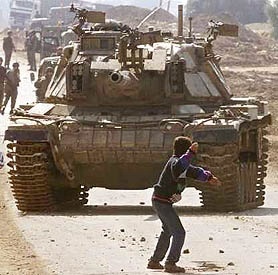I’ve been thinking about the idea of children as revolutionaries and resistance fighters for a very long time. It’s a complicated matter—the abuses faced by Rwandan child soldiers are a reminder to not romanticise such figures. But I am also increasingly frustrated by the implicit and explicit demand that all Palestinians should present themselves as very particular kinds of passive victims, if they are to gain any sympathy. And among them, babies and children have become particularly potent symbols of innocence. This brief essay is an intial foray into the subject.
If you like this, please consider supporting my work.
Al Jazeera and other outlets have just reported that “Israeli forces have opened fire on a group of children in the occupied West Bank, killing a 14-year-old Palestinian-American boy and wounding at least two others, according to the Wafa news agency.” The teen, identified as Omar Mohammed Rabea, was an American citizen. Despite this, it is unlikely that his death will cause much furore in the United States, where the criticism of the ongoing genocide in Gaza focuses on innocence, and the fact that Rabea was among a small group of teens who hurled rocks at Israeli soldiers immediately consigns him to an unacknowledged class of deserving victims. There will not signs and placards decrying his extermination, at least in the U.S or in Europe, where millions march every now and then, demanding that the state of Israel “stop killing babies” or children. Rabea, and many like him who take up the weapons of resistance they can quickly access, will not be counted among them.1Edward Said, while not a child at the time, was also much reviled for throwing a rock.
In 2000, 15-year-old Faris Odeh became an iconic figure, literally, when he was photographed throwing a rock at an Israeli tank: an AP photograph of him doing just that made him a symbol of resistance. Only ten days later, he was shot and killed by an Israeli soldier.
Childhood is a complicated category: the concept of a “child” is bound by history and economics and is neither a universal nor a timeless concept. If you were an eighteenth-century peasant in England, your children were simply labourers alongside you, while your landlord’s offspring of the same age were taken care of by nannies and governesses. These inequalities continue to this day, in Europe and elsewhere: a Dalit child in India is unlikely to access even basic nutrition or schooling and Dalit children are frequently raped and treated as sexual fodder by upper caste men. In the United States, Florida governor Ron DeSantis and others would like to reduce child labour protections in order to create a workforce of teens who might replace the dwindling population of immigrants in low-wage workplaces like restaurants and resorts. Of course, these will be children drawn not from the upper classes or elites, but from the already struggling lower and working class.
Who gets to be a child? In the midst of horrific bombings and deliberate executions, who gets the benefit of sympathy and an outpouring of love? I’ve long wondered about the entirely justified outcry against baby-killing, which nonetheless places a burden of innocence on those who grow up filled with anger and revolutionary ardour after watching the ongoing and relentless carnage around them. As someone who is against the genocide and wants it to stop, I often nod in agreement with friends, colleagues, and many Israelis who rail against the killing of babies and innocent children, and I’m horrified by those who praise the killing of children. But I grow increasingly weary of the constant evocation of and the demand for innocence. It requires Palestinian children to present themselves as unwilling to resist the forces that are blasting their houses, families, and homeland to smithereens.
Rabea, and Odeh before him, are only two in a long line of youth resistors, and there are thousands of others whose stories we rarely see in the west, but will liberals and leftists be as willing to march on their behalf? We are accustomed to only caring about “children” as long as we can see them as passive and innocent, as undeserving of the brutality they face every day, a carnage they fully understand as part of a long, historical degradation of their right to their land. Any action or hint to suggest that they have agency, an understanding of history, and the will and determination to resist this horrific genocide immediately turns them into mere people deserving of their fate.
Who, in wartime, gets to be a child, to be mourned as an innocent? Can we even think about the child as a revolutionary?

If you like this, please consider supporting my work.
See also:
Against Humanity: Ma’Khia Bryant and George Floyd
Image: Associated Press / Laurent Rebours, via Wiki

Don’t plagiarise any of this, in any way. I have used legal resources to punish and prevent plagiarism, and I am ruthless and persistent. I make a point of citing people and publications all the time: it’s not that hard to mention me in your work, and to refuse to do so and simply assimilate my work is plagiarism. You don’t have to agree with me to cite me properly; be an ethical grownup, and don’t make excuses for your plagiarism. Read and memorise “On Plagiarism.” There’s more forthcoming, as I point out in “The Plagiarism Papers.” If you’d like to support me, please donate and/or subscribe, or get me something from my wish list. Thank you.

